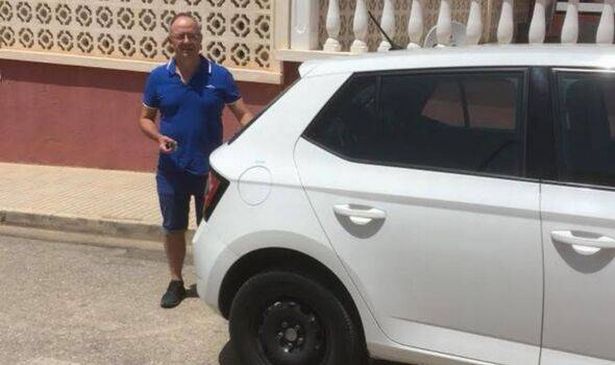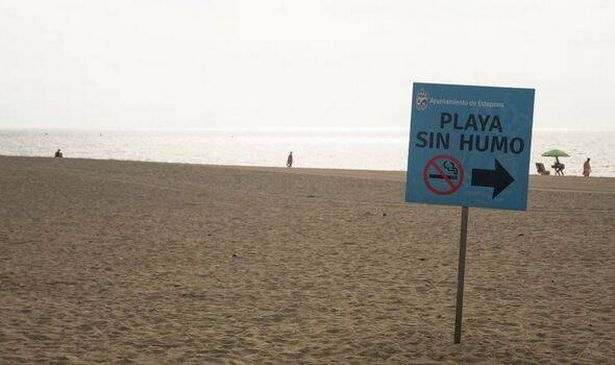EXCLUSIVE: From car washing in the street, to smoking and vaping in public areas in Spain, we take a look at the rules taking expats and travellers by surprise Jacqueline and Barry were stunned by some of the rules and regulations (Image: INSTAGRAM)
Jacqueline and Barry were stunned by some of the rules and regulations (Image: INSTAGRAM)
Two British expats, who left Essex for Spain in 2019, have been taken aback by some of the country’s unexpected regulations. The couple, Barry and Jacqueline, who have lived in Villamartin in Orihuela’s municipality for six years, were particularly stunned to discover that washing or fixing vehicles in public could lead to hefty fines.
The married pair have thankfully been lucky to avoid punishment themselves, but think it’s important for other expats and visitors to be clued up.
After moving to their new home, the couple were quickly informed about the strict rules regarding vehicle maintenance in public areas. Jacqueline shared: “The car washing rule took my husband and I by surprise, we were thankfully warned about it before falling victim to a fine ourselves, but more people should know about it.”
Shaun Matthews, who has a YouTube channel named Expat in Mazarrón, also addressed this peculiar regulation when many of his subscribers questioned him about it. He advised: “I don’t know why, but yeah you can’t wash your car in the street.”
 Travellers could be handed a fine if they ignore a very precise car rule (Image: INSTAGRAM)
Travellers could be handed a fine if they ignore a very precise car rule (Image: INSTAGRAM)
Should you be caught making a mess while cleaning your car on the roadside, Shaun said this could result in a “heavy fine”. Pressed on whether cars could be washed on private property, he reassured that it’s generally acceptable as long as one is careful not to let the water spill onto public roads.
To avoid the risk, he advised drivers to use a car wash facility instead, stating that some prices in his area are as low as three euros. According to Article 4.2 of the Reglamento General de Circulación, it’s forbidden to “throw, deposit or abandon substances on public roads that can obstruct traffic, create danger, or damage infrastructure”.
This reportedly includes water, soap, and dirt from washing cars, as per CarInsuranceSpain.Es. The website suggests that fines can vary depending on the municipality. They can reportedly range from €30 (around £25) in small towns to as high as €3,000 (around £2,563) in large cities.
However, this wasn’t the only unusual rule that surprised the couple after their move to Spain.
 Barry and Jackie moved to Spain in 2019(Image: Getty)Noise levels
Barry and Jackie moved to Spain in 2019(Image: Getty)Noise levels
Spain has laws and regulations concerning noise, which can vary by autonomous community or municipality. Common quiet hours are typically from 10pm to 8am on weekdays, and this is often extended to 11pm or midnight on weekends and holidays.
While these standards seem reasonable, some Spanish towns, like the one where the couple live, reportedly observe an ‘afternoon siesta time’, which means a noise restriction can be enforced during usual lively hours.
Sharing his experience with this apparent rule, Barry said: “It happens a lot over here. We were at a 89th birthday party in a pub, we were sitting outside on the terrace. It was about 6pm and the police turned up, checking the music licence for the pub.
“The music was deemed too loud, so it went off at 6pm. If there is a bit of noise in the pub, they are straight round. No one argues with the police, there is no debate when they tell you to do something. They don’t like noise.
“Our neighbour lived in Torrevieja and his wife was hoovering in the afternoon, and his Spanish neighbour banged on his door and told him to stop.”
Driving in flip flops
Whilst it’s not illegal to drive in flip flops, it’s recommended to always wear suitable footwear. As per the Spanish news outlet SUR, the Guardia Civil states: “It is not specifically forbidden to drive with flip flops, but you can be penalised for not being able to maintain freedom of movement to control the pedals well.”
Barry advises: “I would avoid driving in flip flops to avoid any hassle and fines.”
 A growing number of public spaces are banning smoking and vapes (Image: GETTY)Smoking and vaping in public places, such as the beach
A growing number of public spaces are banning smoking and vapes (Image: GETTY)Smoking and vaping in public places, such as the beach
Barry says smoking and vaping has been banned on some beaches, but not all. Jacqueline added: “The rules vary depending on the place, I have previously been told to move into a smoking area while vaping. There are some terraces and areas designated for smokers and vapers outside, but neither are allowed inside.”
Spain is gradually banning smoking and vaping in public areas, including restaurants, terraces and beaches, under a new Government scheme. Reports suggest that vapers could face a €200 (around £171) fine for breaching this law.
Vaping indoors at public venues could result in even larger penalties of up to 500 euros (around £420). These new measures were detailed by Spain’s Health Ministry as part of a three-year plan covering all of the 17 Spanish regions.
It’s recommended to check local signs to see if a beach is “playa sin humo” (smoke-free). Municipalities typically indicate whether a beach permits vaping or smoking.
Drinking alcohol in public places
The Foreign, Commonwealth and Development Office has cautioned British nationals, highlighting: “You cannot drink alcohol in the street in some areas of Spain. You can be given an on-the-spot fine. There are strict controls on drinking and sexual activity in public places, including on beaches.”
Barry also believes travellers need to be mindful of the drink-driving rules being stricter than the UK.
“It’s virtually nil mgs, they wanted it nil but then realised that people use alcohol for cooking, so it couldn’t be nil,” he remarked.
 Barry has urged travellers to be mindful of the rules (Image: INSTAGRAM)Updating your residency every five years
Barry has urged travellers to be mindful of the rules (Image: INSTAGRAM)Updating your residency every five years
“Residency after five years can be extended to 10 years if you have behaved yourself,” Barry says. Spain has updated its residency requirements for UK citizens post-Brexit.
As detailed on Gov.UK, from 6 July 2020, UK nationals residing in Spain, with rights under the Withdrawal Agreement, must apply for the new Tarjeta de Identidad de Extranjero (TIE).
This card confirms their status as per the Withdrawal Agreement terms. It is available to all UK nationals who were legally resident in Spain before 1 January 2021.
Meanwhile, according to Europa.EU, EU nationals obtain permanent residence rights in another EU country after five years of legal, continuous living.
After this period, individuals can secure a permanent residence document reaffirming their right to live indefinitely in the nation. This differs from a registration certificate, which is not mandatory.
